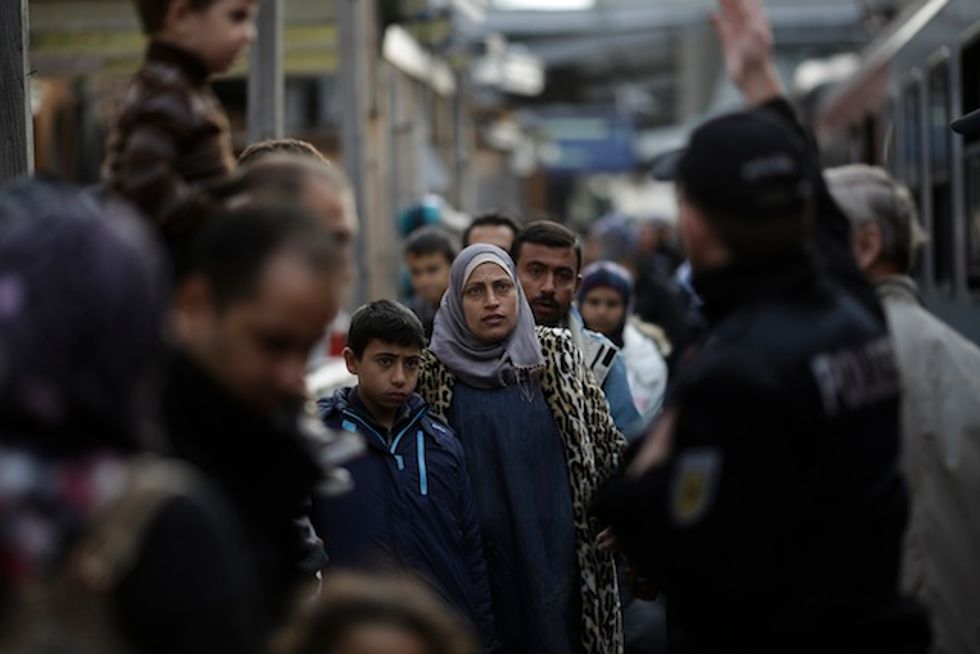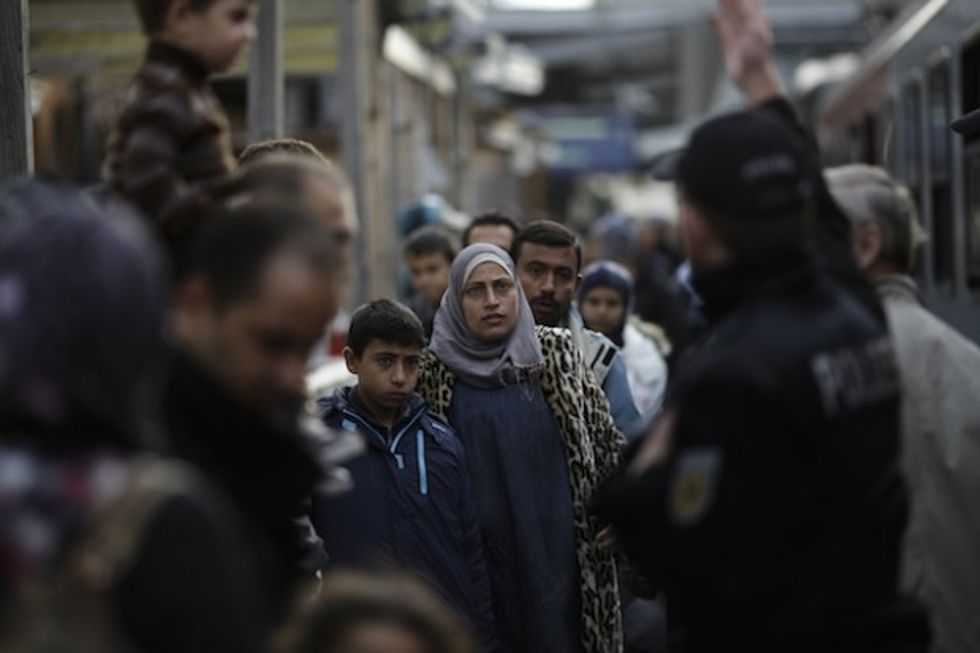
A police officer, right, advise refugees to follow him after they were pulled out of a train by German Federal Police at the train station of the south German border town Passau, Germany, Wednesday, Sept. 16, 2015. (AP Photo/Markus Schreiber)

Let’s talk about the 800-pound gorilla in the room. No politician will touch it and no citizen wants to acknowledge it in an era where political correctness has run amok.
But we have to.
“It” is Europe’s desperate refugee crisis. It’s a truly global situation, the seriousness of which is unparalleled in modern times.
Put simply, it’s the largest single human movement in Europe since World War II and a religio-sociographic earthquake the likes of which the world hasn’t seen for centuries.

Ultimately, the situation can be a good one.
That’s because adept, intelligent politicians can turn social, political, and economic risks into opportunity. Migrants, for example, can backfill an aging European labor pool, are ready to work, and can help by raising overall birth rates to shore up a shaky demographic pyramid.
Wharton University Professor Robert Meyer notes that refugee immigration can have long-term positives. The highly skilled start businesses while the lower skilled or no-skilled take jobs locals don’t want. That’s what happened in the 1960s when Fidel Castro sent people packing for the United States. Today, Meyer observes, at least 40 percent of the start-ups in Silicon Valley have an immigrant as a founder.
But this is where things get tricky.
Like many people, I am hard-pressed to use intelligent and politician in the same sentence these days. A positive outcome is dependent on positive people.
Right now, Europe is a stunted mess, and its citizens, like our own, feel economically insecure. Many are still reeling from the global Financial Crisis of 2008-2009.
Citizen trust is at or near the bottom of the barrel when it comes to entrenched political leaders. If even a single Syrian refugee commits an act of terrorism, there’s going to be hell to pay politically. Not surprisingly, nationalist sentiment is building.
Over the short term, this will be played out as humanitarian concerns collide with austerity policies, housing needs, and integration. Already strained public finances are going to get crushed. That’s not yet registered for most people.
If Europe is to survive, its self-interested officials have to involve business leaders and private finance in making rapid policy changes. That’s because business leaders are far more direct than political apparatchiks.
They will make decisions based on skills, benefits, and training needs that by their very definition involve a level of segregation. Critics will call foul based on the apparent “discrimination,” much the way they have lined up against Donald Trump’s position on Mexican immigration. They’re not the same thing.
One is an economic/humanitarian need while the other is a security risk. Countries that have refused to engage abroad are now going to bear the brunt of that failure. Germany and America, for example, still do not grasp that inaction has led to direct battlefield escalation.
There’s also a corresponding danger inside Europe itself from sleeper agents using millions of refugees as cover for hijrah or immigration jihad. Islamic State has openly threatened to flood Europe with 500,000 fake refugees, and unlike President Barack Obama’s “red line,” chances are they mean it.
I am not surprised that the Bulgarian State Agency for National Security, for example, is already investigating five men – refugees – caught at the Gyueshevo checkpoint with decapitation videos, jihadist prayers, and Islamic State propaganda on their phones. More will follow.
It’s worth noting that not a single Gulf States nation has taken in refugees, citing that the risk of terrorism is too high, even as Jordan, Lebanon, and Turkey have accommodated an estimated 3 million people. Evidently they know something Europe doesn’t or simply doesn’t yet have the stomach to admit.
There is no concept of “burden sharing,” notes Sarah Leah Whitson, executive director of Human Rights Watch for the Middle East and Africa. “The Saudi, Emirati and Qatari approach has been to sign a check and let everyone else deal with it,” she says. Even so, according to Breitbart, Britain has already donated more than Saudi Arabia, the UAE, and Qatar combined, throwing in more than £920 million versus a collective £589 million.
Meanwhile, Greece, Italy, and France are merely acting as conduits and sending desperate people onward. Hungary, Austria, and Germany have clamped down as I write this.
At the end of the day, you can call “it” Islamophobia, unadulterated racism, or even xenophobia, but the net result is the same – a massive economic impact at a time when Europe is almost totally unprepared to handle a rolling parade of desperation.
Making matters worse, we are talking about potentially millions of people who, by their own admission, are not culturally compatible and who are showing very little if any desire to fit in to the millennia-old civilization Europe enjoys today.
To put this in perspective, Eurostat reports that the EU never settled more than 7,400 refugees a year between 2008 and 2014, despite having a population of 507 million. The United States with a population of 330 million settles only an average of 66,000 refugees a year.
More poignantly, approximately 516,219 non-EU citizens are ordered to return home each year… and, not surprisingly, less than half do.
The staggering numbers involved here suggest a sobering truth:
Everything from women’s rights, to law, to intellectual freedom – concepts brought forth in the Age of Enlightenment dating from the 1620s to roughly the 1780s – is at risk.
–
TheBlaze contributor channel supports an open discourse on a range of views. The opinions expressed in this channel are solely those of each individual author.